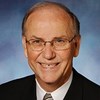Consistency of thought and behavior is indeed rare. The vagaries of life often are characterized by a continual shifting of principles and practices “to meet the demands of our modern world.” There is today, perhaps as always, a dearth of exemplars of principled life—role models of internal and social consistency and integrity.
The 90th anniversary of Leonard Read’s birth reminds us of a lifetime devoted to the practice and promotion of principled freedom. Through The Foundation for Economic Education, Mr. Read devoted almost 40 years to describing and calling for an ideal. He took the time and exerted the effort to analyze daily ac-tivities-personal, social, and political—in the context of principles and moral philosophy. It seems somewhat ludicrous that we readily accept group action which would be considered unconscionable if initiated by individuals. Yet, the political agenda is generally shaped by special interest focus on outcomes with little thought for the violation and destructive abandonment of principles. Rarely do we ask, “Is this morally right?” in a discussion of proposed legislation. Our preoccupation is rather with good intention and popular appeal. Thus, unprincipled behavior often becomes the law of the land through action without thought and the anonymity of group process. In the absence of principle, power rules. FEE continues to carry the banner for principled lives, public and private. The example and heritage provided by Leonard Read require our thoughtful perseverance in a cause served best by responsible, principled individuals.
—Bruce M. Evans
President
“I, Pencil” Gets Around
In December 1958, FEE’s founder and longtime president, Leonard E. Read, wrote a short piece about an ordinary wooden lead pencil. He wrote in the first person, as if the pencil itself were writing. “I, Pencil,” he wrote, “am a complex combination of miracles: a tree, zinc, copper, graphite, and so on. But,” the pencil continued, “to these miracles which manifest themselves in Nature an even more extraordinary miracle has been added”—the “miracle” of uninhibited creative energy, bringing together millions of tiny know-bows of countless individuals. No human being could mastermind the complexities of making a pencil, Read wrote, any more than he could put molecules together to create the tree which is cut into small slats from which pencils are formed.
Read’s explanation of the complicated division of labor and international cooperation required to produce something as simple as a pencil has struck a responsive chord with many people all over the world. “I, Pencil” has been reprinted in anthologies for school children, translated into foreign languages, and parodied in an ad several years ago in Review of the News. A diagram of a pencil was used by Hillsdale College, with quotes from the article, to illustrate why the free market is essential. Milton Friedman mentioned “I, Pencil” in his 1980 TV series, Free to Choose, and in his book of the same name. Thomas Sowell referred to it in his profound and thoughtful Knowledge and Decisions, when he wrote, “It has been said that no one knows how to make even a simple lead pencil.”
“I, Pencil” has even been used in a recent best-selling Japanese comic book, Japan Inc., Introduction to Japanese Economics, which has been translated into English and is now available in this country. Several panels describe the ingredients, the tools, and the inter-national cooperation needed to make a pencil. Then the legend reads, “It’s not that each person works for the sake of making pencils. All of them work for the goods they want . . . . we make the goods they want so they’ll make the pencils we want . . . . It’s not that someone somewhere gives an order. Pencils are made right before our eyes, but it seems like a miracle.”
—BBG
The Loss of Freedom
Much of the loss of freedom with the growth of big government has been concealed because the direct losses have been suffered by intermediary decision-makers—notably businessmen—and it is only after the process has gone on for a long time that it becomes blatantly obvious to the public that an employer’s loss of freedom in choosing whom to hire is the worker’s loss of freedom in getting a job on his merits, that a university’s loss of freedom in selecting faculty or students is their children’s loss of freedom in seeking admission or in seeking the best minds to be taught by.
—Thomas Sowell
Knowledge and Decisions
While They Starve
The Government of Ethiopia has so severely restricted emergency relief operations in the country’s north, a region ravaged by both drought and war, that as many as two million people are out of reach of any known system of food distribution, aid officials and Western dip-1omats say.
Because of the restrictions, these officials say, hundreds of thousands of tons of donated food are piling up at ports and may never reach those in need. Agricultural seeds, too, are not being distributed. This means that farmers who must soon plant crops cannot do so, which could lead to even greater problems next year.
—The New York Times,
April 29, 1988

